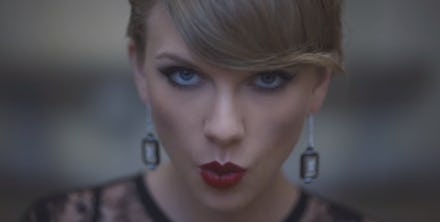Thanks to Taylor Swift, You Have to Ask Permission to Use These Five Phrases

Love her or hate her, Taylor Swift has a knack for coming up with catchy lyrics. They drive her fans crazy and get repeated all over social media. But it's recently come to light that Swift is also ferociously protective of the sacred pieces of "intellectual property" she's bestowed on her people.
In fact, she's trademarked several normal pieces of the English language. The following five phrases now belong to Swift:
- This sick beat™
Vox reported that in advance of 1989's release, Swift's massive marketing machine trademarked five relatively common English-language phrases that appear as lyrics on the album. It means that if anyone wants to say any of those phrases in a "public appearance" or print them on any clothing, they have to ask the almighty Swift for permission.
Time to start coming up with some new slang.
This is ridiculous for many reasons. First, it's absurd to think Swift owns the phrase "this sick beat,™" which appears as a throwaway lyric in the breakdown of "Shake It Off." She definitely did not come up with the slang definition of the word "sick" to describe something as awesome. Secondly, the "Shake It Off" beat is dishonorably far from being our musical culture's shining example of a "sick beat." J Dilla is rolling in his grave.
But Swift has spoken, and her team has been diligent. "This sick beat™" and "party like it's 1989™" are now blocked from use on guitar straps, wind chimes, cushions, pot holders, hosiery, Christmas tree decorations, educational services, non-medicated toiletries, beach umbrellas and so many other useless things that Swift will eventually sell you.
The other three phrases are less protected, which is great because "Nice to meet you. Where you been?" — a lyric from "Blank Space" — belongs to unrequited lovers everywhere these days.
She isn't the only one, though. This kind of trademarking is a fairly common practice in the celebrity world. Swift's patents may be the world's first trademarked lyrics, according to the Guardian's Eamonn Forde, but there are plenty of other absurd trademark stories in pop culture.
For example, Forde points out that Paris Hilton managed to trademark the phrase "that's hot" when she was still a thing. She won a lawsuit against Hallmark in 2010 when the company tried to use the phrase on a gift card. Former NFL quarterback Tim Tebow trademarked his signature "Tebow" pose, which is essentially kneeling with a fist to one's head. Beyoncé and Jay Z also trademarked the name of "Blue Ivy Carter" only a few days after their daughter was born.
This is insane. It makes sense artists would want to protect their merchandising opportunities with the record industry in the disarray that it is. Singers can't rely on record sales or streams for profits, so merch is something of a last resort.
But Swift is not exactly in dire need of cash, and trademarking common English phrases is a pretty underhanded way to squeeze more money out of her brand. We can only hope the practice does not become commonplace, or else one day songwriters will have to tiptoe through elaborate legal landmines every time they write just to make sure they're not incidentally quoting Swift.
Probably the best solution here would be to write lyrics for the lyrics sake — not for their marketability.
h/t Vox